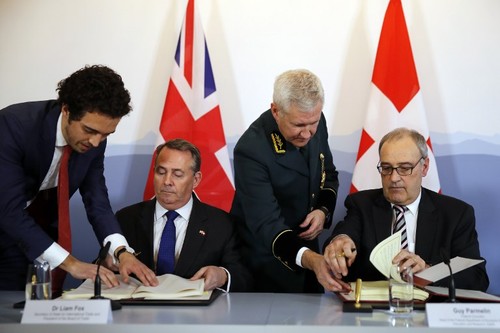|
 Britain's International Trade Secretary Liam Fox (2nd L) and Swiss Economy Minister Guy Parmelin (R) in Bern in February, 2019 (Photo: AFP) Britain's International Trade Secretary Liam Fox (2nd L) and Swiss Economy Minister Guy Parmelin (R) in Bern in February, 2019 (Photo: AFP)
|
6 weeks ahead of the scheduled departure, the UK had signed 13 trade continuity deals with 30 countries and blocs including the Southern African Customs Union trade bloc, the Caribbean nations, Iceland, Israel and Norway. These trade deals will only take effect after Brexit.
Brexit, in fact, just means a change in certain trade conditions, not an elimination of trade relations. So, even after Brexit takes place, the UK will remain a trade partner of the EU and vice versa. The EU has signed 40 free trade agreements with 70 countries and as an EU member the UK is obliged to honor those deals. But how will the UK view those deals after it leaves the EU? Britain began to negotiate trade continuity deals with other countries two years ago. To date, it has signed 13 continuity deals with 38 trade partners which are important importers of UK goods like Ireland, Switzerland, Africa, Latin America, and South Korea. It has also signed with other countries including ASEAN countries, 16 new trade agreements which will take effect after Brexit.
Most recently, the UK signed a trade continuity agreement with the Southern African Customs Union (SACU) which comprises South Africa, Botswana, Lesotho, Namibia, Swaziland, and Mozambique. “This trade agreement, once it is signed and takes effect, will allow businesses to keep trading after Brexit without any additional barriers,” Britain’s International Trade Secretary Liz Truss said on Wednesday in a statement.
Trade between Britain and the six African countries was worth 12 billion USD last year, with machinery and motor vehicles topping British exports to the region.
The UK has also held trade talks with the US, its top ally and top profitable market. Britain’s annual exports to the US are worth around 140 billion USD and its imports from the US are worth 81 billion USD. Britain suffers a deficit of 70 to 120 billion USD per year in trade with the EU. US President Donald Trump says the US-UK trade ties have been obstructed by the EU which does not allow EU members to negotiate separate free trade deals. President Trump said he hopes trade between the two countries will increase post Brexit. UK Prime Minister Johnson said a trade deal with the US will pave the way for British enterprises to take greater advantage of a large market. If the agreement is signed, bilateral trade could increase 50% in 4 years.
Britain and China have negotiated a trade agreement and agreed to sign it after Brexit. A Russian trade representative in the UK Boris Abramov said Russia wants to finalize a trade deal with the UK after Brexit. Mr. Abramov said that post Brexit, with or without a deal, Moscow and London will continue to trade under WTO policies.